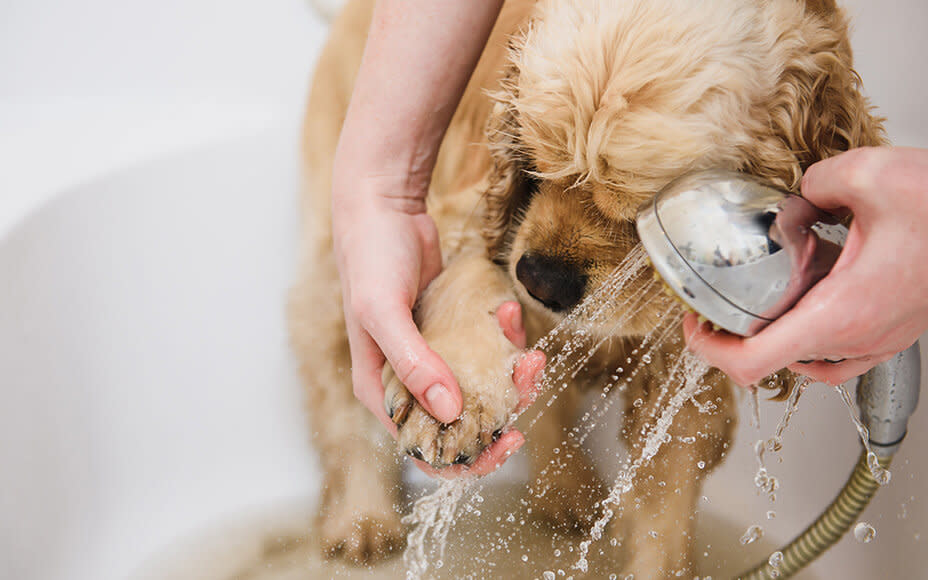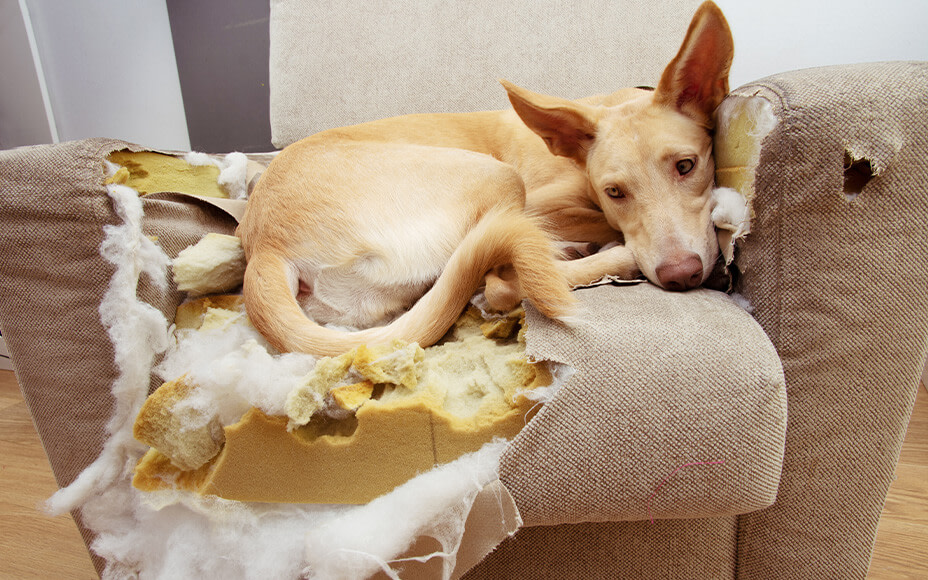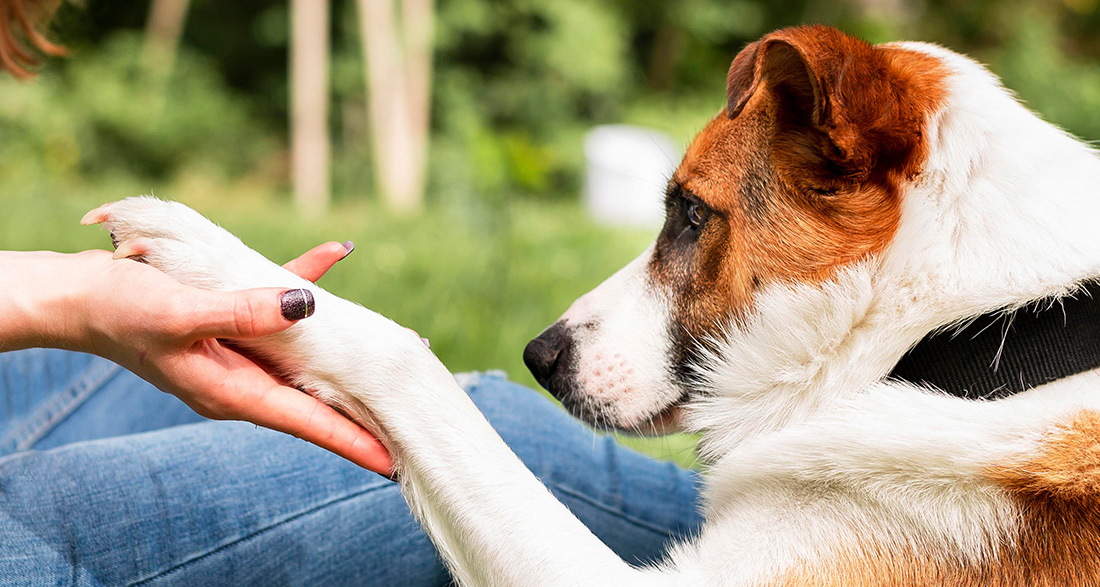Occasionally licking paws is okay, but excessive licking and gnawing are not! Possible causes and treatments for paw licking.
Is it normal for my dog to lick its paws?
Your furry friend licks its paws or maybe nibbles on them a bit more intensely from time to time? In principle, this is not a cause for concern. If the paws itch, your dog may try to “scratch” and find relief through licking or nibbling. Some particularly clean dogs may also attempt to clean accumulated dirt between their toes by licking.
When is paw licking problematic?
You should become attentive if your dog licks its paws more often than usual and/or multiple times a day for an extended period. On the one hand, this behavior may be an indication that something is wrong (illness, stress). On the other hand, constant licking destroys the skin barrier. Consequently, it leads to inflammation on the paws, which, in turn, favors the multiplication and penetration of bacteria and fungi. This results in even stronger itching, leading to more paw licking, ultimately causing a progressive deterioration of the skin, possibly leading to a lick granuloma.

To break free from this cycle, you should investigate the cause of paw licking and nibbling. Common causes include:
Intolerances or Allergies
Allergies and intolerances, such as those against regular food or even grass or mites, can lead to intense itching and, consequently, paw licking. Additional signs typically include hair loss, open skin areas like lick granulomas or hot spots, and ear infections.
An allergy to grass or mites can be effectively treated with the right medications. For food allergies, an elimination diet is usually the solution, ultimately transitioning to, for example, a hypoallergenic diet.
Living sensitively and itch-free: With our hypoallergenic food, we ensure joy in the bowl – because even sensitive pets deserve a tasty meal!
Parasites like Harvest Mites
Parasites are annoying little creatures that our pets can pick up anywhere. However, harvest mites, especially in late summer between July and October, can be a nuisance for our dogs. While our four-legged friends happily roam through meadows and fields, mature harvest mites make themselves comfortable in the fur of the paws. The mature parasites themselves are generally harmless to our dogs. However, their larvae leave a saliva secretion that can cause intense itching in affected dogs. The result: the animals start licking their paws.
Parasites like harvest mites can usually be effectively treated with a suitable antiparasitic.
Overgrowth of Yeast Fungi
Just like in humans, yeast fungi also live on your four-legged friend’s skin. They are generally harmless and don’t cause any trouble. However, if your pet’s skin flora is disturbed, for example, due to an allergy or frequent licking, yeast fungi can proliferate, causing itching. Washing with a specific medical shampoo can help with successful treatment.
Especially dog breeds with wrinkled skin like the Shar Pei or Pug are more prone to skin problems caused by yeast fungi. Pay special attention to hygiene in the skin folds. Our Deep Clean Shampoo has antibacterial properties and supports in case of skin issues. Thanks to its purely natural ingredients and pH neutrality, it is excellent for all sensitive fur noses!

Skin Fungi
The occurrence of a skin fungus usually goes hand in hand with (circular) hair loss and intense itching. A veterinarian can detect and treat a skin fungus. Again, a specific medical shampoo can be beneficial in this case.
Note that skin fungi can be contagious and can thus be transmitted to other animals or even to children and adults in the household.
Psychological Problems
Behavioral abnormalities, such as increased licking and nibbling on the paws, often indicate psychological issues. Before that, you should have your pet checked by veterinarians, and if physical causes are ruled out, you can also consult dog trainers or behavior therapists.
Especially sensitive and nervous dogs are easily stressed and tend to excessively lick their paws. This behavior is somewhat comparable to nail-biting in some people. In severe cases, dogs may be so stressed that they exhibit self-destructive behavior by excessive gnawing and biting on their paws. Therefore, it is essential to find out why your dog is showing this behavior and work together to address the cause.

Foreign Body in the Paw
Observe if your dog always licks a specific paw. Then, a small foreign body getting stuck may be the reason for the constant licking. In summer, for example, many dogs quickly pick up a grass seed, which is not only uncomfortable for our dogs but can also become dangerous. Once under the skin, seeds can migrate through your dog’s body, causing severe inflammation.
A thorn, a small pebble, or other hard, sharp objects can also pierce the skin of the paws. If you can’t see or feel these and, therefore, can’t remove them with tweezers, have your dog examined by veterinarians. They can better identify foreign bodies with the help of magnifying glasses, apply a drawing ointment, or surgically remove the troublemaker with a small incision.
Matting of the Fur
Especially in long-haired dog breeds, the hair on the paws can become a problem. Hair on the paws can quickly become long, tangle, and form small knots. This is very uncomfortable for our four-legged friends and can be associated with pain and skin inflammation. If you have a breed with long hair, such as a Poodle or Doodle, regular checking and trimming of the paw fur should be part of regular grooming.


